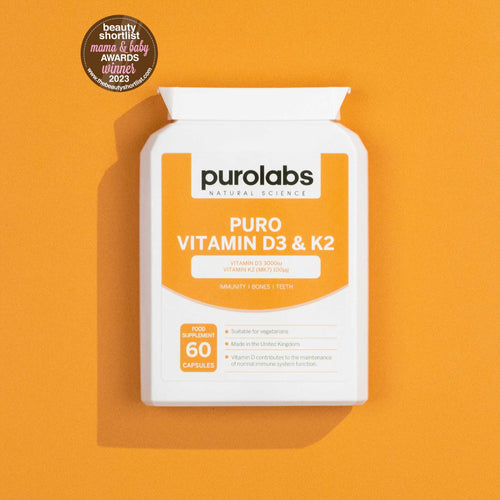Vitamin D…the sunshine vitamin as it’s otherwise known. It is the vitamin that comes to mind when we think of supplementation, with the NHS advising the general population to take 400IU vitamin D daily to meet our health requirements. Whether you’re a fan of supplementation or not, vitamin D is the nutrient that everyone can agree is a pretty vital and commonly prescribed nutrient.
Vitamin D is needed at all stages of life, from bone and hormone health to immune function and skin health. Vitamin D really is an all-rounder and a supplement that everyone should consider supplanting for optimal health.
If you live in the UK, then chances are that you’re simply not getting enough vitamin D. It is thought that 24% of the UK population are vitamin D deficient, making it one of the most prevalent vitamin deficiencies in the UK1.
Read on to discover the range of benefits vitamin D has, as well as common signs and symptoms of deficiency, and how to ensure that your vitamin D levels are topped up all year round…
Vitamin D Benefits
What makes deficiency of this nutrient so troublesome, is the sheer breadth of health benefits and bodily functions that Vitamin D contains in order to keep us healthy:
- Vitamin D is required for the synthesis aka the creation of all hormones, including our steroid hormones (oestrogen/testosterone etc). Inadequate vitamin D levels have been linked to many hormonal conditions and infertility.
- It is an essential nutrient for immune health. Vitamin D is required to aid both the adaptive and innate immune system meaning that it helps to regulate our bodies fight system against pathogenic invaders2, as well as helping to protect our bodies from internal mutations i.e., tumour formation.
- Vitamin D, along with calcium, vitamin K and magnesium are essential nutrients needed for bone health. This is especially important pre-, during and post-menopausal years where we are more at risk of conditions associated with bone disease such as osteoporosis and osteoarthritis). Vitamin D aids in calcium absorption, helping to keep our bones strong and healthy3.
- Vitamin D has been shown to potentially help with mood regulation. A study found low vitamin D levels as a risk factor for autoimmune diseases such as fibromyalgia, and chronic mood conditions like anxiety and depression4.
Signs of Vitamin D Deficiency
Whilst it’s important to be aware of the signs and symptoms of vitamin D deficiency, especially if you live In Northern climates, if you do note some of the below as symptoms do check with your general health practitioner. Testing can be carried out for vitamin D deficiency, to ensure that you are treating the symptoms effectively.
Common signs and symptoms of vitamin D are the following:5
- Fatigue, accompanied by aches and pains
- Poor quality sleep
- Depression or feelings of sadness/low mood
- Hair loss
- Loss of appetite
- More prone to viral infections
At-risk Groups
Whilst vitamin D deficiency is one of the most common nutrient deficiencies, particularly in the UK, there are groups in which vitamin D supplementation is especially important:
- Elderly populations and peri-post menopausal women – In order to preserve bone health.
- Those with a hormonal imbalance – To aid with hormone production.
- Night shift workers – Nocturnal sleep patterns will significantly reduce sun exposure.
- Dark skinned – Individuals with darker skin tones are at more risk of vitamin D deficiency. Skin tones which contain more melanin, absorb more UV rays, meaning less is penetrated through the skin barrier to be absorbed and utilised by the body6
Vitamin Deficiency in the Northern Hemisphere
One of the main reasons why vitamin D deficiency is so prevalent in the UK and in countries far north of the equator can be explained by how we absorb and synthesis the nutrient. We’re aware that the weather here in the UK is temperamental, with rainy overcast days being commonplace. Whilst we adapt to the dreary climate, it does come at a health cost.
We absorb vitamin D two ways; through food and sunlight.
Food – We ingest the nutrient from food like we do with all fat-soluble vitamins, via our intestines. Vitamin D in the foods we eat, pass through our stomach and into our intestines where most of our nutrients are absorbed and transported around the body7. To optimise absorption, always ingest vitamin D rich foods with a source of fat. As you can see from the below vitamin D rich foods, nature has it covered. Many vitamin D rich foods are naturally found from fatty sources.
Common Vitamin D-rich food sources are:8
- Oily fish: Salmon, mackerel, herring, sardines
- Butter
- Egg yolks
- Mushrooms
- Liver
- Red meat (grass fed/organic)
Sunlight – When our skin is exposed to sunlight, we absorb vitamin D in the form of dehydrocholesterol through UV B rays, which are converted to previtamin D9. This form of vitamin D is then converted into the form of Vitamin D which we use for all the health benefits outlined in this article (and more!).
Absorbing vitamin D through sunlight has benefits, with one being a great option for those with compromised gut function. As explained, we require our intestines to be functioning optimally to absorb vitamin D and utilise it appropriately. For those with compromised nutritional absorption such as those with IBS or IBD, absorbing vitamin D through sunlight can be optimal.
Fifteen minutes of sun exposure daily in the summer months is recommended for optimal vitamin D levels. However, for those living in the UK and northern climates, it is difficult to get access to fifteen minutes of daily sun. Supplementation, as recommended by the UK government, therefore is an excellent alternative.
Not All Vitamin D Supplements are Created Equal
Whilst vitamin D supplementation is an easy and efficient way to top up your vitamin D stores, it is important to note that the quality of the supplementation makes all the difference.
Firstly, the supplementation needs to cover the government recommended 400IU daily intake, which our supplement here at Purolabs covers! What the supplement also needs to contain is vitamin K2, which many vitamin D supplements on the market miss.

Vitamin D3 & K2
Vitamin K2 is required to help shift vitamin D into the body’s tissues to be utilised. When it comes to nutrients, whilst potency is important, absorption is key. Many vitamin D supplements on the market contain adequate doses, however if the supplement lacks vitamin K2, then vitamin D cannot be utilised, and its health benefits are limited. If, for example, bone health is a key consideration, vitamin K2 is needed to help shift calcium into the bones to help strengthen them10.
You can obtain vitamin D through diet and sunlight, however, for sustained and measured vitamin D intake, supplementation is recommended during winter months. It is a nutrient that can really transform your health and help your immune system during cold season and help you to ward off viruses and infections.
Whilst the government recommends vitamin D supplementation to the general population, if you are unsure as to whether vitamin D supplementation would benefit you and you are concerned about deficiency, do speak to your health practitioner who will be able to provide you with further information.

 Beauty
Beauty
 Bone Health
Bone Health
 Brain Health
Brain Health
 Energy
Energy
 Eye Health
Eye Health
 Gut Health
Gut Health
 Hair
Hair
 Hormonal Health
Hormonal Health
 Heart Health
Heart Health
 Immunity
Immunity
 Joints
Joints
 Menopause
Menopause
 Pregnancy
Pregnancy
 Kids
Kids
 Sleep
Sleep
 Stress & Mood
Stress & Mood




















